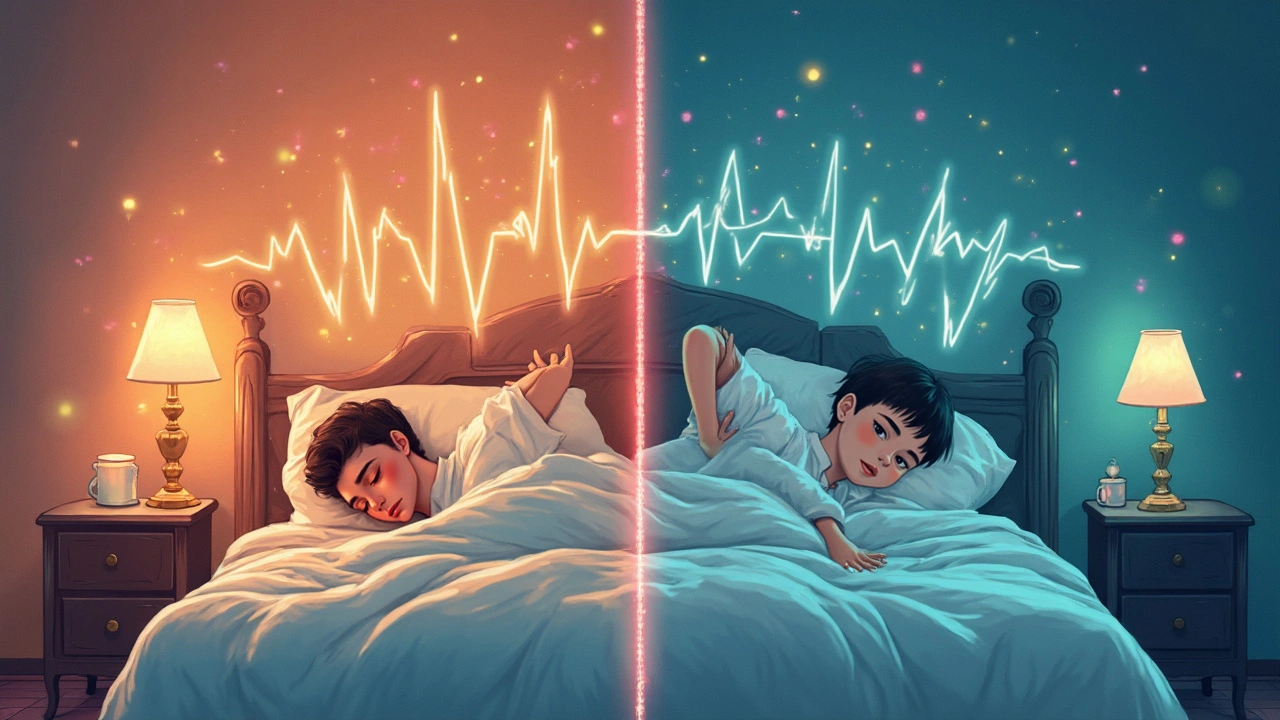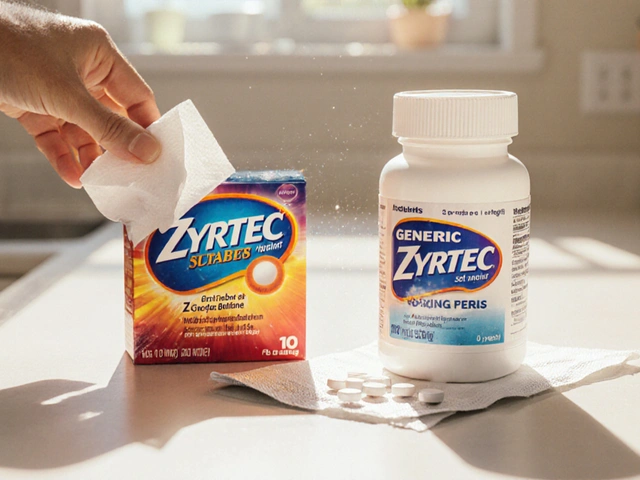Waking up with your heart pounding or skipping beats isn’t something you just brush off. For anyone dealing with heart rhythm disorders—like atrial fibrillation, ventricular tachycardia, or even ‘harmless’ palpitations—a rough night’s sleep can easily tip the balance the next day. Many folks think heart rhythm is all about genetics or diet, but sleep is the sneaky third wheel. The numbers don’t lie: according to the British Heart Foundation, people with poor sleep are up to 40% more likely to develop heart arrhythmias or see their symptoms get worse. Yet, good sleep tends to be ignored at clinics, squeezed in at the end of a long list of ‘lifestyle changes’. Curious why? Let’s peel back the covers and dig into why sleep is a game-changer for anyone with heart rhythm problems.
How Poor Sleep Fuels Arrhythmias
Think about your last rotten night of sleep—did your heart feel fast, fluttery, or just not right? There’s something very real going on. When you don’t sleep enough, or your sleep is broken, your body kicks up levels of adrenaline and cortisol. These are stress hormones, and they make your heart’s electrical system more jumpy. That’s basically poking the bear when it comes to arrhythmias—especially things like atrial fibrillation. The moment you go a day or two on less than seven hours, studies show your risk of abnormal heartbeats jumps up by nearly a third. One reason: your vagus nerve, which helps slow the heart down and keep its rhythm steady, gets way less active at night if you’re tossing and turning.
It doesn’t stop there. Sleep apnea—a sneaky condition where you briefly stop breathing in your sleep—affects at least 70% of people with atrial fibrillation, often without them knowing. Sleep apnea doesn’t just make you tired; it depletes your blood oxygen and triggers micro-arousals, which jack up adrenaline and can throw your heart rhythm into chaos. One huge study in The Lancet in 2022 found treating sleep apnea dropped arrhythmia episodes by more than 50% in affected patients. So, it’s not just about feeling rested. Ignore broken sleep, and you’re turning up the risks for emergency visits, medication changes, and sometimes even sudden hospital stays.
But it’s not only the length of your sleep that matters. If you snore, wake feeling unrefreshed, or notice your partner staring at you in the night like you’ve stopped breathing, it’s probably time to check for sleep disorders. With arrhythmias, even “mild” sleep problems hit harder. Fragmented sleep—waking up lots, even for a minute—jolts your nervous system and makes those heart skips or pauses way more likely. It becomes this wild cycle: bad sleep amps up arrhythmias, which then make it harder to sleep, spinning you further from recovery.
Curious how all these sleep quirks stack up? Check out this table showing some eye-opening stats on heart rhythm patients and sleep issues in the UK:
| Sleep Issue | Impact on Arrhythmia | Prevalence in Heart Rhythm Patients |
|---|---|---|
| Short Sleep (<6 hours) | Raises risk of arrhythmia by 29% | 37% |
| Insomnia | Linked to 2x more arrhythmia episodes | 42% |
| Sleep Apnea | More than 50% more arrhythmia events | Up to 70% |
| Fragmented Sleep | Disrupts vagal tone; boosts heart rate variability | 65% |
Numbers like these make it really tough to just dismiss sleep as some ‘nice to have’ thing. Missing out on restful, deep slumber messes with important heart-protective processes that go on at night. For heart rhythm patients, it’s not just about being tired. It can mean waking up in A-fib, running to urgent care, or feeling drained and out of rhythm for days. Prioritising sleep isn’t just good advice—it’s essential self-defence.

Unlocking the Science: Why Sleep Repairs the Heart’s Rhythm
You might think sleep is just about shutting your eyes. Actually, it’s a full-on maintenance workshop for your entire body, but especially for your heart’s delicate electrical system. During deep non-REM sleep (that’s the really restorative stuff), your blood pressure drops, heart rate steadies, and your body dials down adrenaline. These aren’t just technical details—your heart’s pacemaker cells need this downtime to stay in sync. Miss out on those deep sleep stages, and your nerves get extra twitchy, primed for arrhythmia chaos the next day.
Scientists in Bristol and London have been using overnight heart monitors to track what happening in arrhythmia patients while they sleep, and their findings are wild. One thing they noticed? Poor sleepers had measurably more irregular beats—both in number and in type—on nights they didn’t get solid deep sleep. And every single patient saw a spike in heart rate variability (a sign of stress on the heart) after just two consecutive nights of bad sleep. This isn’t just about comfort; these changes directly influence risks for strokes and future heart failure.
It goes even deeper. Your body flushes out excess sodium and fluid while you sleep, reducing strain on your heart. At the same time, inflammation markers—the chemical signals that tell your immune system to ramp up—drop to their lowest when you’re in deep sleep. With arrhythmias, high inflammation makes your heart muscle more excitable. So you can see, skipping sleep is like pouring petrol on the fire. A 2023 report from the NHS Sleep & Cardiac Health Taskforce found that patients with poor sleep habits had hospital admission rates twice as high due to arrhythmia-related emergencies compared to those who slept well.
Mental health plays its part, too. Anxiety, which is common in people managing irregular heartbeats, gets worse when you’re running on empty. Lack of sleep makes stress hormones shoot up, which can misfire the delicate signals keeping your heart ticking smoothly. And if you’re stuck in a cycle of anxiety and disrupted sleep, guess what? Arrhythmias come knocking even more often. It’s a three-headed monster—mental stress, heart stress, sleep stress—all feeding on each other.
Another angle: people who work shifts, have erratic sleep, or do things that disrupt their body clocks (think night owls, or folks who binge late-night TV) are at double the arrhythmia risk compared to 9-to-5ers who go to bed at a steady time. Your body loves rhythm, just as much as your heart does. Every time you drag your sleep-wake schedule all over the map, you’re inviting trouble in more ways than one. So apart from medicine and procedures, restoring sleep is a direct route to protecting your heart’s electrical health. Doctors are catching on, with sleep clinics now popping up in some cardiology departments, linking up with wearable heart tech to spot issues early—something unheard of just five years ago.

Practical Sleep Fixes for Heart Rhythm Disorder Patients
Okay, so sleep is directly tied to arrhythmias—what can you actually do to fix it? Let’s skip the usual ‘get more rest’ advice and talk about moves that make a real difference, especially for those managing irregular heartbeats.
First up, get serious about sleep hygiene. This isn’t just fluff for health magazines—it’s about creating an evening routine that chills your nervous system and signals your heart it’s time to wind down. A practical tip from Dr. Sarah Mackenzie at the University Hospitals Bristol: avoid all screens (yes, even scrolling your phone) for at least an hour before bed; blue light tells your brain to stay alert, spiking adrenaline.
Also, build a wind-down routine that fits you—some folks like gentle stretching, others a warm shower, or even guided breathing exercises. The key is consistency. Going to bed and waking up at the same time—even on weekends—stabilises your internal clock and helps your sleep run on autopilot, which is crucial for heart rhythm control.
- Darken your bedroom: Any light at night, even from standby buttons or streetlights, keeps your body in half-awake mode. Total blackout (using an eye mask if needed) can deepen sleep stages.
- Stay cool: A room set between 16-18°C is perfect for most. A cool environment tells your body it’s night, helping melatonin (the sleep hormone) kick in faster.
- Watch what and when you eat: Heavy meals close to bedtime—not good. Alcohol and caffeine can mess with your sleep cycles for hours, even if you’re ‘used to them’.
- Keep naps to less than 30 minutes and avoid late afternoon snoozes, even when you’re wiped out from interrupted overnight sleep.
If you snore, wake up gasping, or need to use the toilet multiple times a night—with or without arrhythmia symptoms—see your doctor for sleep apnea testing. Home sleep tests are now available from most British NHS trusts, and treating sleep apnea with a CPAP or dental device can cut arrhythmias in half within weeks. It’s not an exaggeration—patients treated for sleep apnea often say their palpitations nearly vanished once their breathing at night improved.
And don’t underestimate the impact of evening stress. Nightly worries can sabotage your rest and stoke arrhythmias. Tried-and-true relaxation tricks, like writing down what’s on your mind before you get into bed or doing three minutes of slow, deep breathing (count to four as you inhale, six as you exhale) are backed by cardiac sleep clinics for a reason. It shifts your body out of ‘fight or flight’ and back into recovery mode, where your heart can reset itself.
Sticking with a sleep diary for two weeks is another tip that works. Just jotting down what time you go to bed, get up, and any wobbly heart or sleep moments can spot patterns that you wouldn’t notice otherwise. This info helps your doctor or nurse see if meds, routines, or hidden problems like sleep apnea are behind your rough nights.
Think of these tweaks as small, practical repairs you can make right now. They won’t make you impervious to heart drama, but they massively lower your chances of scary symptoms popping up. Good sleep is the best kind of insurance policy for your heart’s rhythm—and your peace of mind to boot.









I used to think sleep was just for lazy people 😴 but after my AFib episode last month? I'm now sleeping 8 hours like it's my job. My heart stopped feeling like it was doing the cha-cha at 3am. 💖
soo... sleep apnea is why my heart goes nuts at night? i thought it was just stress or coffee. i snore like a chainsaw but never thought it was a problem. guess i need to get that test lol
This is one of the most clinically significant yet under-discussed connections in modern cardiology. The autonomic dysregulation caused by chronic sleep deprivation directly exacerbates ectopic activity in the atrial myocardium. I urge all patients with documented arrhythmias to undergo formal polysomnography. The data is unequivocal.
They don't want you to know this but sleep apnea is a government ploy to sell CPAP machines. The real cause? EMF radiation from your phone under the pillow. They’ve been hiding this since 2012. Look up Project SleepMind. Your heart isn't malfunctioning - it's resisting surveillance.
We’re all just electrons in a cosmic rhythm, man. Your heart? It’s dancing to the universe’s playlist. But when you mess with sleep, you mute the bass. And suddenly, the song goes off-key. Maybe your soul’s just trying to tell you to slow down. 🌌✨
Sleep? In America? Please. We’re a nation of caffeine addicts and 3 a.m. scroll zombies. If your heart skips because you watched three Netflix shows in pajamas, maybe the problem isn’t your heart - it’s your entire culture. Wake up. Literally.
In Nigeria, we say 'sleep is the first medicine'. For heart patients, this isn’t advice - it’s survival. I’ve seen patients with severe AFib stabilize after just 2 weeks of consistent sleep + CPAP. No drugs. No surgery. Just rest. Your body is smarter than your doctor’s checklist.
I tried all this sleep stuff. Dark room? Cool temp? No screens? I felt like a monk who forgot how to live. Then I just took a Xanax and slept like a baby. Problem solved. Who needs science when you have pharma?
You know what’s really dangerous? The fact that doctors still treat sleep as a luxury. It’s not. It’s a physiological imperative. If your heart is a car, sleep is the oil change. Skip it and you’re not just risking breakdown - you’re inviting a full engine explosion. And yet, they still don’t screen for it.
I’m a nurse in Vancouver and I’ve seen this over and over. Patient comes in with palpitations, we check meds, EKG, everything... then we ask about sleep and they say 'oh I just sleep when I can'. Two weeks of sleep hygiene later? Symptoms halved. It’s not magic. It’s biology. Do the work.
Sleep is the silent rebellion against the machine. In a world that glorifies hustle, choosing rest is an act of radical self-love. Your heart doesn’t care about your productivity. It only cares if you let it breathe. So turn off the lights, silence the notifications, and let your vagus nerve do its quiet, sacred work.
While the correlation between sleep disruption and arrhythmia is statistically significant, one must consider the confounding variables: socioeconomic status, access to healthcare, and underlying psychiatric comorbidities. To reduce this complex pathophysiology to 'just sleep more' is a dangerous oversimplification.
Oh wow, another article telling me I’m failing at life because I can’t sleep. Thanks. I already feel guilty enough about my 3 a.m. TikTok binges. Maybe if I didn’t have to work two jobs just to afford my beta-blockers, I’d have time to meditate and use blackout curtains. But no. I’ll just keep having AFib. It’s fine.